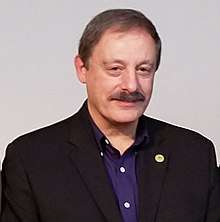Mohammad Shahidehpour
Dr. Mohammad Shahidehpour is a Carl Bodine Distinguished Professor and Chairman in the Electrical and Computer Engineering Department at Illinois Institute of Technology. He is the author of more than 300 technical papers and five books on electric power systems planning, operation, and control.
Mohammad Shahidehpour | |
|---|---|
 Prof. Mohammad Shahidehpour at SGC2018 | |
| Born | July 27, 1955 |
| Nationality | |
| Occupation | Professor |
| Years active | 1981-now |
| Known for | Carl Bodine Distinguished Professor |
Career
Shahidehpour was the president of National Electrical Engineering Honor Society (Eta Kappa Nu) and served on its executive board for eight years. He was Editor of the IEEE Transactions on Power Systems for fifteen years, and is currently the Vice President of Publication for IEEE/PES and also Editor in Chief of the IEEE Transactions on Smart Grid. He is a member of the editorial board of KIEE Journal of Power Engineering (Korea), International Journal of Emerging Electric Power Systems, IEEE Power and Energy Magazine, and International Journal of Electric Power Systems Research. Shahidehpour is an IEEE Distinguished Lecturer and has lectured across the globe on electricity restructuring issues. He is also an Honorary Professor at North China Electric Power University in China and Sharif University of Technology in Iran. He is a Fellow of IEEE.
Awards
Shahidehpour is the recipient of:
- 2007 IEEE/PES T. Burke Hayes Faculty Recognition Award in Electric Power Engineering
- 2005 IEEE/PES Best Transactions Paper Award
- 2004 IEEE/PSO Best Transactions Paper Award
- Edison Electric Institute's Outstanding Faculty Award
- ΗΚΝ’s Outstanding Young Electrical Engineering Award
- Sigma Xi’s Outstanding Researcher Award
- IIT's Outstanding Faculty Award
- University of Michigan’s Outstanding Teaching Award
Education
- Ph.D. Electrical Engineering Department, University of Missouri, Columbia, 1981
- M.S. Electrical Engineering Department, University of Missouri, Columbia, 1978
- B.S. Electrical Engineering Department, Sharif University of Technology, Iran, 1977